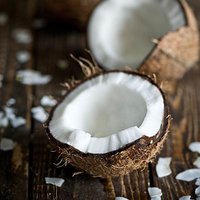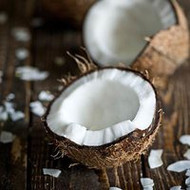Why Coconut Oil is Good for You
Posted by Simple Girl on 28th Jun 2016

Coconut oil is one of those highly versatile, all-purpose solutions to various beauty, health, and first-aid needs. Although it's been demonized over the years for its saturated fat content, the sat-fat in coconut oil is comprised of medium chain fatty acids, or MCFAs, which are metabolized differently than the long-chain versions you'll find in a big ol' steak or a hunk of cheese. MCFAs are easily digestible, and they go straight to the liver, where they're used for energy production and increase your metabolism.
What Can Coconut Oil Do For You?
Most of the MCFAs found in coconut oil are lauric acid, which turns into monolaurin when you ingest it. Monolaurin increases your immunity and helps you fend off viruses and helps prevent disease. Coconut oil is the richest natural source of lauric acid, which may help:
- Lower blood pressure.
- Reduce bad (LDL) cholesterol levels and increase good (HDL) cholesterol levels.
- Maintain flexible arteries to prevent atherosclerosis.
- Rev up the metabolism.
- Improve glucose tolerance.
- Improve the body's absorption of vitamin D, calcium, and other essential minerals to increase the strength of your bones.
- Reduce levels of yeast and candida to ward off yeast infections.
- Fight infections and viruses, thanks to its antimicrobial, antiviral, and antibacterial properties.
Three Types of Coconut Oil
Coconut oil comes in partially hydrogenated, refined, and virgin versions.
Although the MCFAs in coconut oil are healthier than the trans fats found in highly processed oils, partially hydrogenated coconut oil is pretty much devoid of these benefits and has been found to be just as bad for you as other trans fat-laden, heavily processed oils.
Refined coconut oil is chemically extracted from processed (meaning deodorized and bleached) coconut meat, making it another poor dietary choice.
But virgin coconut oil? Now, there's the stuff! Virgin coconut oil is extracted from fresh coconut meat without the help of chemicals or high temperatures, and according to the Academy of Nutrition and Dietetics, it has excellent antioxidant properties.
How to Use Coconut Oil in Your Diet
Coconut oil doesn't go rancid as quickly as other oils, and it doesn't break down at high temperatures like olive oil and others tend to do. This makes it great for frying up a mess of eggs or whipping up a stir fry.
For a dose of healthy fat, toss a tablespoon of coconut oil in your morning smoothie. It'll also make the texture creamier and the flavor richer.
Use coconut oil in your baked goods for a little added sweetness and flavor. It works great as a substitute for the less-healthy butter and shortening.
How to Use Coconut Oil on Your Body
Coconut oil is wonderful for your skin and hair, too:
- Rub it into your scalp and leave it on overnight to treat dandruff and a dry, itchy scalp. Wash it out the next morning, and your hair will be soft and shiny to boot.
- Remove your eye makeup and help restore nutrients to your skin.
- Use it instead of shaving gel for a close, smooth shave and to prevent irritation and leave your skin silky smooth.

